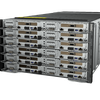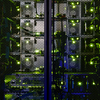Episode 214: Addison Snell and Michael Feldman analyze this week's top HPC news, including Lenovo's new water-cooled HPC system and the latest US Exascale project budget.
Googles Quantum AI Lab has revealed it is testing a 72-qubit quantum processor in its bid to become the first companyto demonstrate quantum supremacy.
Niagara, Canadas newest multi-petaflop supercomputer tasked for academic use, is now available to researchers across the country.
Chinese-base tech giant Alibaba is challenging American cloud providers in Europe with an HPC service designed for users runninga variety of compute-intensive and data-intensive workloads. The company also unveiled a new cloud-based quantum computing platform.
The US Department of Energy (DOE) would reap $636 million for exascale computing next year if Congress gives the go-ahead to President Trumps budget request for FY 2019. The amount requested is $376 million above the funding level for FY 2017.
Legal tech startup LawGeex has published a study demonstrating their artificial intelligence software is able to identify issues in Non-Disclosure Agreements (NDAs) faster and more accurately than experienced lawyers.
Lenovo has unveiled the ThinkSystem SD650, a densely constructed, direct water cooled server aimed at the HPC market. Its first big test will come later this year when it's deployed in Germany's most powerful supercomputer, the SuperMUC-NG.
Episode 213: Addison Snell and Michael Feldman analyze Google's latest move and what Cray's financials say about the HPC industry.
Silicon Valley startup Fathom Computing has announced that it is building an optical computer that can train large-scale neural networks much more efficiently than GPUs.
Hewlett Packard Enterprise (HPE) has been selected to supply seven new supercomputers for the US Department of Defense (DoD) High Performance Computing Modernization Program (HPCMP).








